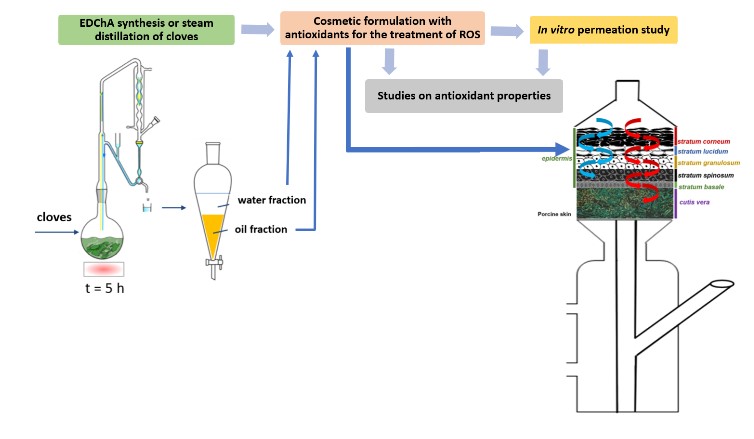The main focus of this work is to extend the knowledge about the complexity of issues of oxidative stress. Natural compounds play a serious role in multiple aspects of both human, leading to clear health-promoting effects. This work is focused on the potential application cosmetic formulations containing including but not limited to of clove water and isolated clove oils on their aid in the control of the diseases. The aim of our work was to prepare to evaluate cosmetic formulations containing clove oil, eugenol or new eugenol ester derivative (eugenyl dichloroacetate - EDChA) but also cosmetic formulations containing the aqueous phase obtained after separation of essential oil following the clove buds steam distillation. To evaluate the antioxidants transdermal delivery system, in vitro permeation experiments in a Franz diffusion cell were performed using pig skin. The antioxidative capacity of the cosmetic formulations obtained was determined by the DPPH free radical reduction method. In the next stage, the antioxidant activity (DPPH, ABTS, and Folin–Ciocalteu methods) of the fluid that penetrated through pig skin and of the fluid obtained after skin extraction, were also evaluated. For comparison, studies of cosmetic formulation containing alone dichloroacetic acid (DChAA) were as well carried out. The obtained cosmetic formulations were characterized by of antioxidant activity estimated after 24 hours of conducting the experiment, which indicates long-term protection against reactive oxygen species (ROS) in the deeper layers of the skin. The results of this work contribute to the development of cosmetic formulations with antioxidant potential, emphasizing that the water phases are waste from the process of cloves steam distillation and are not used to prepare cosmetic formulations. The use of waste water from the clove buds steam distillation process is environmentally friendly and not allows us to waste, containing however valuable biologically active compounds (furfural, methyl salicylate, 4-allilofenol, eugenol, α- and β-caryophyllene, eugenyl acetate, β-caryophyllene oxide). Together, these results suggest that cosmetic formulations may be potential drug candidates for chemopreventive, antineoplastic and antimutagenic therapy.

